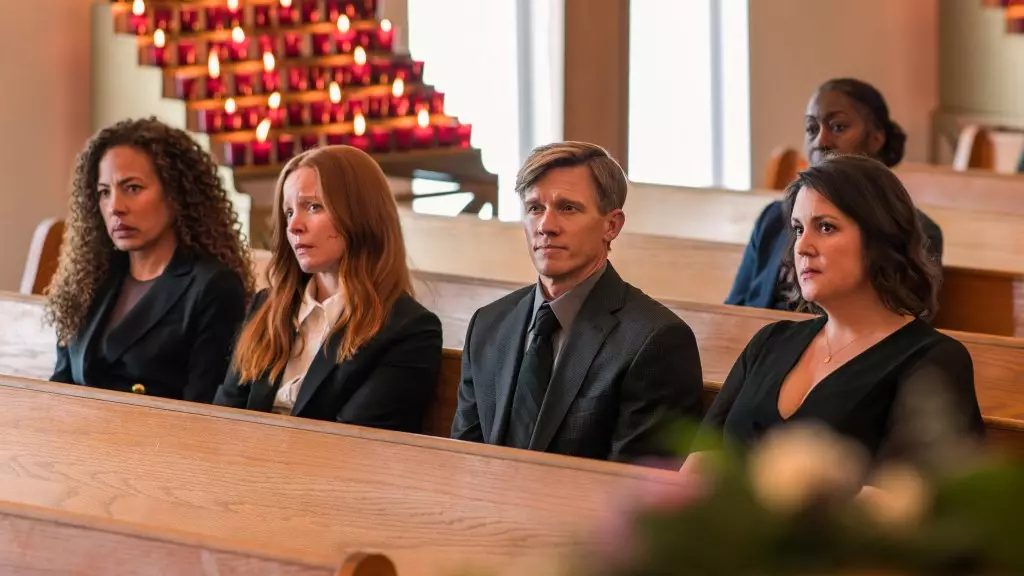The Showtime series “Yellowjackets” has captivated audiences with its depiction of survival and psychological complexity, and the recent penultimate episode of Season 3, titled “How the Story Ends,” has solidified its dramatic prowess. The series has garnered a reputation not just for its thrilling plot twists, but for its nuanced character development, particularly evident in the heartbreaking departure of Adult Van, portrayed by the talented Lauren Ambrose. This staggering moment, steeped in emotional weight, reflects not only the dark themes of the show but also the deeper connections that creators forge with their characters.
Co-creator Ashley Lyle has expressed profound personal resonance with Van, pointing to her own experiences as formative influences behind the character. This connection amplifies the tragedy of her demise, as audiences witness not only a fictional loss but a reflection of the creator’s personal journey. Lyle recalls her own coming of age in the video rental aesthetic that defines Van’s character, encapsulating the nostalgia and yearning that permeates the series’ fabric. Through this lens, the loss of Van transcends mere plot progression; it becomes an exposition of Lyle’s own narratives intertwined with social commentary on the struggle between light and darkness in one’s life.
The Duality of Survival: Sacrifice Versus Self
Van’s fate is starkly woven into the larger narrative arc of survival that “Yellowjackets” explores. Diagnosed with terminal cancer, Van lives with the existential dread of impending death, presenting a storyline drenched in irony: while her teammates resort to desperate measures to survive, Van grapples with her mortality through a lens of moral questioning. When facing Melissa, another former teammate, Van’s choice to hold a knife at her former friend’s throat embodies the pivotal tension between the urge to survive and the weight of one’s conscience. Here, the series ventures into a powerful philosophical discourse about morality under duress and how desperation can shape one’s identity.
Lyle emphasizes how Van’s story presses on the existential inquiry of what it means to hold onto one’s identity in the face of overwhelming despair. This theme is articulated poignantly when Van, amid an emotional turmoil, declares a rejection of malevolent survival methods, signifying a profound realization. It’s a narrative of empowerment within defeat; despite knowing she could do terrible things under duress, she opts to reject that path, signaling a complex understanding of self-worth in the face of mortality.
The Craft of Performance: Ambrose’s Heartfelt Portrayal
In her performance, Lauren Ambrose transforms Van into a multi-dimensional figure, skilled in navigating the murky waters of guilt, survival, and self-discovery. Her portrayal culminates in a scene that’s been described by Lyle as “absolutely stunningly beautiful.” Ambrose’s ability to convey deep emotional turmoil, grappling with self-identity under the stress of a life-or-death scenario, showcases her range as an actress and her understanding of the character’s intricacies.
This moment serves not only as a plot climax but as a defining characteristic of “Yellowjackets” itself; the series often blurs the lines between villainy and heroism, leaving viewers to ponder the ethical implications of each character’s choices. Ambrose’s nuanced acting in this pivotal scene resonates far beyond the screen, compelling audiences to confront their own beliefs about sacrifice and redemption. The act of letting go—of both the knife and the darker impulses that accompany her struggle—becomes a transformative embrace of authenticity.
Through the Lens of Youth: Liv Hewson’s Impact
Liv Hewson, who brings Van’s teenage version to life, characterizes the emotional intensity that permeated the production of this season. Aware of the impending fate awaiting her character, Hewson’s performance encapsulated not only the innocence of youth but also the burgeoning understanding of mortality. Such contrasts contribute to a richer narrative tapestry, intertwining past and present, innocence and culpability.
The emotional gravity surrounding Van’s character arc serves as a poignant commentary on how relationships evolve under stress and trauma. It showcases that survival isn’t merely a physical endeavor; it is deeply emotional and ideological, compelling each character to confront unthinkable truths about themselves and those they love. With each death, the series provokes thought on what it means to remain humane while existing on the precipice of moral ambiguity.
In summation, “Yellowjackets” continues to demonstrate its success in exploring complex emotional landscapes and the toll that life’s haunting decisions can have on the characters’ psyches. The loss of Van underscores the fragility of life and the resilience of the human spirit—a narrative exploration that resonates deeply with those who dare to reflect on the very essence of existence.

